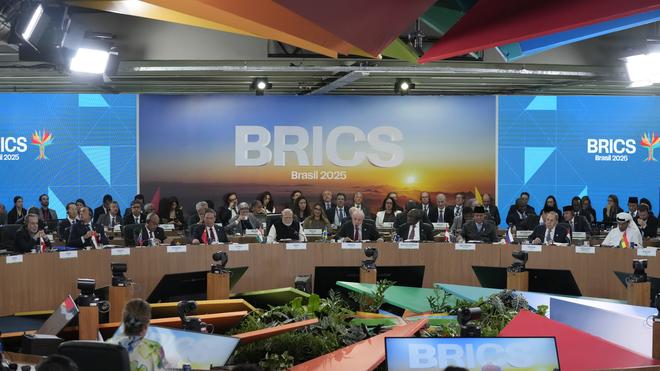Rio de Janeiro: At the 17th BRICS summit in Rio de Janeiro, the group of major developing nations issued a declaration denouncing rising tariffs and recent attacks on Iran. However, in a carefully worded statement, the bloc avoided naming U.S. President Donald Trump, Israel, or even its own member Russia.
The summit’s final declaration criticized the growing trend of protectionist tariffs, calling them a violation of World Trade Organization (WTO) norms that could disrupt global trade and supply chains. Though no country was directly named, the criticism appeared to target the Trump administration, which has recently ramped up trade penalties. In a retaliatory message on his social platform, President Trump warned that nations aligning with “Anti-American policies of BRICS” could face an additional 10% tariff.
Brazilian President Luiz Inácio Lula da Silva, the summit’s host, also voiced concern over NATO’s move to raise military spending, asserting that “it is always easier to invest in war than in peace.” This sentiment was echoed in the summit’s declaration.
Iran’s Presence and West Asia Focus
Iranian Foreign Minister Abbas Araghchi represented Tehran at the summit, stepping in for President Masoud Pezeshkian, who stayed back following June attacks on Iran. Araghchi condemned Israel and the U.S., blaming them for the escalation and urging UN members to hold them accountable for rights violations. He warned that the consequences of the conflict would spread beyond borders.
While the BRICS declaration condemned the strikes on Iran and called for humanitarian relief in Gaza, it did not mention Israel or the U.S. by name. The bloc reaffirmed support for a two-state solution to the Israel-Palestine conflict, though Iran later issued a reservation on that point, claiming the model had repeatedly failed.
Ukraine War: Russia Avoids Criticism
Despite the ongoing war in Ukraine, the summit document made only one brief reference to the conflict — to condemn Ukrainian attacks on Russian territory. The declaration reaffirmed members’ national positions as previously expressed in international forums but avoided any direct criticism of Russia.
Russian President Vladimir Putin addressed the summit via video, avoiding international travel due to a pending arrest warrant linked to the Ukraine invasion. Chinese President Xi Jinping also skipped the summit for the first time since 2012.
Mixed Cohesion Amid Growing Membership
The BRICS bloc, originally comprising Brazil, Russia, India, China, and South Africa, expanded last year to include Iran, Egypt, Indonesia, Ethiopia, and the UAE. Ten other nations, including Cuba and Vietnam, have joined as strategic partners.
Despite its expansion, experts say BRICS continues to struggle with internal cohesion. The absence of key leaders and uncertainty around representation from newer members has fueled perceptions of disunity. “This moment demands high-level articulation, but we are actually seeing dispersion,” said Professor Joao Alfredo Nyegray of the Pontifical Catholic University in Paraná.
Avoiding U.S. Retaliation
Brazil took a cautious approach at the summit, prioritizing trade and health over contentious financial issues like de-dollarization — particularly after Trump’s return to office. “Brazil wants the least amount of damage possible,” noted Professor Ana Garcia of the Federal Rural University of Rio de Janeiro.
In 2024, Russia had pushed for an alternative BRICS currency system to counter U.S. dominance in global payments, but those efforts have slowed.
Summit Significance for Emerging Economies
Despite its limitations, the summit remains important for participating nations, especially in the face of growing global instability and protectionism. “This is the best opportunity for emerging countries to diversify partnerships,” said Bruce Scheidl of the University of São Paulo’s BRICS study group.
For President Lula, the summit also offered a reprieve from political tensions at home, and a platform to advance climate talks ahead of the COP30 summit in Belém later this year.



